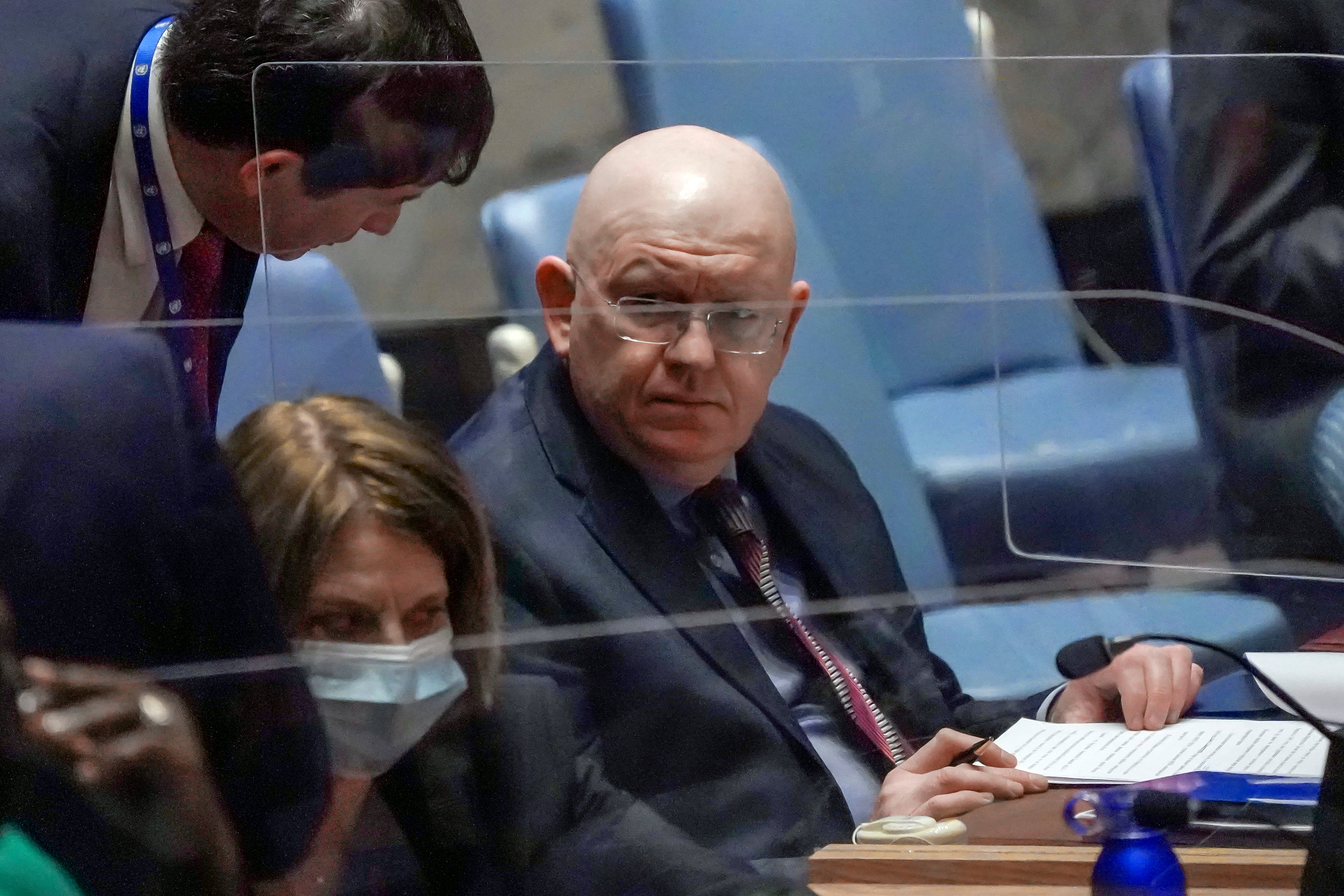Russia won’t ask UN council vote on its Ukraine resolution
Russia says it will not ask the UN Security Council to vote Friday on its draft resolution on humanitarian relief for Ukraine, which has been criticized for making no mention of Moscow’s invasion of its neighbour

Your support helps us to tell the story
From reproductive rights to climate change to Big Tech, The Independent is on the ground when the story is developing. Whether it's investigating the financials of Elon Musk's pro-Trump PAC or producing our latest documentary, 'The A Word', which shines a light on the American women fighting for reproductive rights, we know how important it is to parse out the facts from the messaging.
At such a critical moment in US history, we need reporters on the ground. Your donation allows us to keep sending journalists to speak to both sides of the story.
The Independent is trusted by Americans across the entire political spectrum. And unlike many other quality news outlets, we choose not to lock Americans out of our reporting and analysis with paywalls. We believe quality journalism should be available to everyone, paid for by those who can afford it.
Your support makes all the difference.Russia announced it will not ask the UN Security Council to vote Friday on its draft resolution on humanitarian relief for Ukraine, which has been criticized for making no mention of Moscow's invasion of its neighbor.
It will instead use the scheduled council session to again raise allegations that the United States has biological warfare laboratories in Ukraine, claims that Washington says are disinformation and part of a potential “false-flag operation” by Moscow.
Russia’s UN ambassador, Vassily Nebenzia, made the announcement at a Security Council meeting Thursday afternoon that was called by six Western countries, including the United States, to get an update on the three-week-old war.
He said Russia is not withdrawing the resolution but decided not to seek a vote at this time because of what he called “unprecedented pressure” from Western nations, especially the United States and Albania, on UN member states to oppose the measure.
Nebenzia said Russia plans to go ahead with the council meeting Friday to discuss again its allegations that there are US military biological laboratories in Ukraine. Russian diplomats have presented no evidence to support its claim, which has been repeatedly denied by both the US and Ukraine.
US Ambassador Linda Thomas-Greenfield responded to Nebenzia’s announcement by saying that “their farcical humanitarian resolution ... was doomed to fail.”
“We know if Russia really cared about humanitarian crises — the one that it created — it could simply stop its attacks on the people of Ukraine,” she said. “But instead, they want to call for another Security Council meeting to use this council as a venue for its disinformation and for promoting its propaganda.”
At last Friday’s council meeting on Russia’s initial allegations of US “biological activities,” Thomas-Greenfield accused Russia of using the council for “lying and spreading disinformation” as part of a potential false-flag operation by Moscow for the use of chemical or biological agents in Ukraine.
She said Russia was playing out a scenario put forth in the council last month by US Secretary of State Antony Blinken — that Russian President Vladimir Putin would “fabricate allegations about chemical or biological weapons to justify its own violent attacks against the Ukrainian people.”
Nebenzia said last week Russia's Defense Ministry holds documents charging that Ukraine has at least 30 biological laboratories carrying out “very dangerous biological experiments” involving pathogens, and the work “is being done and funded and supervised by the Defense Threat Reduction Agency of the United States.”
He said Thursday that he will present documents at the council meeting Friday.
Ukraine does have a network of biological labs that have gotten funding and research support from the US But they are owned and operated by Ukraine and are part of an initiative called the Biological Threat Reduction Program that aims to reduce the likelihood of deadly outbreaks, whether natural or manmade. The US efforts date back to work in the 1990s to dismantle the former Soviet Union’s program for weapons of mass destruction.
"The labs are not secret,” Filippa Lentzos, a senior lecturer in science and international security at King’s College London, said in an email to The Associated Press. “They are not being used in relation to bioweapons. This is all disinformation.”
Russia circulated its proposed humanitarian resolution Tuesday. It calls for protection for civilians “in vulnerable situations” in Ukraine and safe passage for humanitarian aid and people seeking to leave the country, but it never mentions the war. The draft also cites the need for “the parties concerned” to agree on humanitarian pauses for evacuating civilians, though it never identifies the parties.
Russia presented its draft a day after France and Mexico announced that a humanitarian resolution on Ukraine that they are co-sponsoring was being moved to the 193-member General Assembly, after two weeks of discussions in the 15-member Security Council. Diplomats said it was clear Russia would veto the resolution.
Nebenzia on Thursday called the France-Mexico resolution “anti-Russia” and said it focuses on political, not humanitarian issues. “That is why Russia put forward its own draft containing within it everything that the humanitarians need” without “political assessments,” he said.
The France-Mexico draft resolution would demand “an immediate cessation of hostilities” and deplores “the dire humanitarian consequences of the hostilities against Ukraine.”
Unlike Security Council resolutions, General Assembly resolutions are not legally binding, but there are no vetoes and they do have clout in reflecting international opinion.
French Ambassador Nicolas De Riviere told reporters before Russia’s announcement about not seeking a vote on its resolution that its draft would fail. To pass in the council requires nine “yes” votes and no veto by a permanent member — the US, Russia, China, Britain and France.
He said France and Mexico would present their resolution in the General Assembly next week.